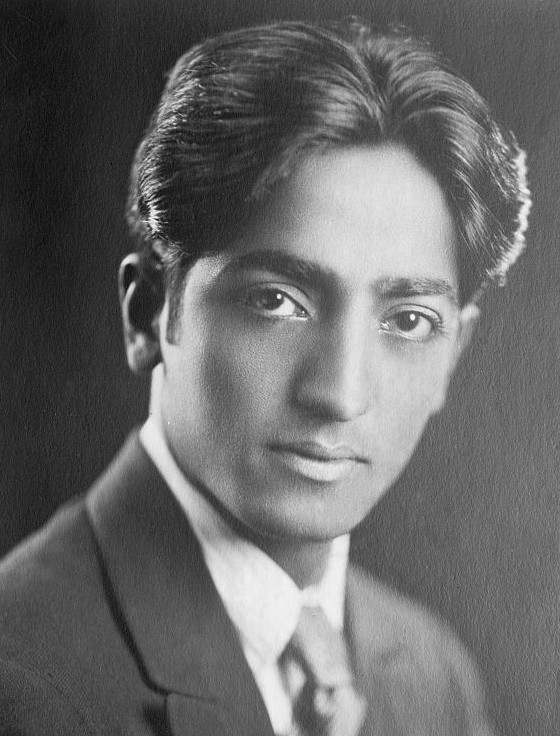Relationships (August 2017 Newsletter)
Jiddu Krishnamurti (1895-1986) in the 1920s
At the start of our classes we each talk about health, work, home and about all of life in general. Many YWB practitioners regularly address their difficulty with relationships. These range from simple daily interactions at home and work, to more serious personal and life-changing ones. Our perceptions are our own, and are the result of our personal experiences from the moment of birth and even in-utero. It is difficult to change ourselves to accommodate the thinking and perceptions of another. Read the contemporary philosopher, Krishnamurti's thoughts below:
You have only one head and look after it for it's a marvellous thing. No machinery, no electronic computers can compare with it. It's so vast, so complex, so utterly capable, subtle and productive. It's the storehouse of experience, knowledge, memory. All thought springs from it. What it has put together is quite incredible: the mischief, the confusion, the sorrows, the wars, the corruptions, the illusions, the ideals, the pain and misery, the great cathedrals, the lovely mosques and the sacred temples. It is fantastic what it has done and what it can do. But one thing it apparently cannot do: change completely its behaviour in its relationship to another head, to another man. Neither punishment nor reward seem to change its behaviour; knowledge doesn't seem to transform its conduct. The me and the you remain. It never realizes that the me is the you, that the observer is the observed. Its love is its degeneration; its pleasure is its agony; the gods of its ideals are its destroyers. Its freedom is its own prison; it is educated to live in this prison, only making it more comfortable, more pleasurable. You have only one head, care for it, don't destroy it. It's so easy to poison it.
Krishnamurti's Journal, September 17, 1973
Among other things the above paragraph may bring to mind, do you begin to see the difficulty with relationships? They are always teetering in the balance. This is known as 'Dukha' (meaning 'bad axle hole' in an old-fashioned bullock driven cart,) the state of humankind to always suffer a bumpy ride on life's journey, rarely in a state of contentment where life flows smoothly. Relationships are thrilling and yet contain a twinge of anxiety, of uncertainty, of loss, of fear...it is so because you are you, and I remain my ego self.
Is it possible to change this state of being? Rumi states, "Yesterday I was clever, so I wanted to change the world. Today I am wise, so I am changing myself." Maybe we should all give it a try every day, and all our lives.
Namaste,
sipra
Well-Being: Seeing Clearly (June 2017 Newsletter)
Sipra, doing well after her first cataract surgery.
Wellness is a state of mind as much as it is a state of being. When we know we can take steps to make life easier and better, we should act. It is that juncture when one can foresee that it is the right time to take steps to change the dysfunction. Life sometimes jolts us into this realization through an uncomfortable incident. It could be the deception of a friend or partner, or some physical or mental discomfort that doesn't seem to be getting better but only aggravating over time. Do something! It will not go away. Walking away or a corrective action, or surgically removing the offensive cause of dis-ease may be expensive in many ways, but it's better done sooner rather than later. The hurt, the pain will soon go away, and you will come out of it stronger, better, healthier.
I have some developing cataracts in both my eyes, and I could wait a few years for them to mature enough to require surgery. Even though they are not really hindering my vision, I decided to get them removed now while I am in good health and recovery should be quick. There is always an element of risk, but one takes the pros and cons and decides on what to do. But do something we must!
I am having two cataract procedures on May 30 and June 13. I will be back to instruct classes when I get the go-ahead from my surgeon. Classes will continue with YWB instructors graciously offering to sub my classes. My daughter, Pia, trained at White Lotus, California, will be visiting Columbus for a week and will teach three classes as well.
Well-Being: Snacking (May 2017 Newsletter)
Everyone is always talking about diet and eating right. Actually it's simple. Just remember to think carefully before consuming anything. Eat well at mealtimes and have a filling meal. Snacking becomes unnecessary. Most snacks like pretzels, crackers and cheese, chips etc. are best avoided.
If you eat well at mealtimes, you don't need to snack. Don't buy snacks that are not so good for you. You will not have them around when you feel you have to snack on something. Don't add additional salt, sugar, butter, cream, or hard cheeses except to season your food.
With fresh food seasons coming up, enjoy fresh fruit and vegetables even for a snack. Still feel like you want to munch on something? Try a few nuts.
Drink plenty of water flavored with lemon or fruit flavors, if you don't like it plain. Avoid pop during, after, or between meals.
You have heard this before. Now just do it. Consistently.
NIYAMA: COMMITMENT TO ONESELF
Niyama: Commitment to Oneself
In the October newsletter we considered commitment as a philosophical concept according to Patanjali's 'Yoga Sutra'. Life is all about commitment and surrender. 'Commitment to the cause and surrender to the result.'
In a practical sense, our commitments make us who we truly are. Do we value our own word? Often we will do all we can to follow through on what we have promised others, but just as often we drop the commitment to ourselves. How can we do our best for others if we don't practice it on ourselves first? How can we feed the hungry when we ourselves are starved?
Start by being your best self! In the study of yoga one learns that it starts with Niyama in Ashtanga (or the Eight Limbs of Yoga) which is the second step in physical, mental and spiritual growth. Niyama (the commitment to daily observances relating to oneself) consists of keeping oneself morally pure in body, mind and spirit (shaucha); being content (santosha); persistently practicing self-discipline (Tapas); self-study/self reflection (Svadhyaya); and focus on the Ultimate Reality or spiritual transformation (Ishwarapranidhana).
Commitment is a conscious decision made by us to/for ourselves. It is made with full awareness of the goal in mind - to be better, and to ultimately be the best we can be in this lifetime. It is a commitment to connect with our better Self, and connect to the world around us in loving and giving ways. It is not at all about how we look or how we present ourselves to the world. Nevertheless, self-care is very much a commitment to ourselves.
Hold your head up high, friend, and breathe deep. Make heads turn in wonder at the majesty of your Being.
Namaste,
sipra


